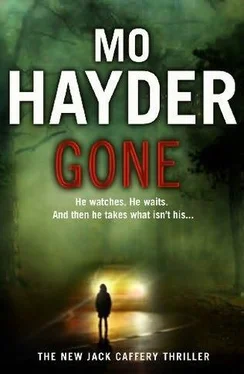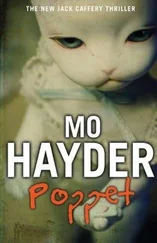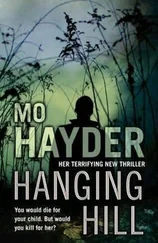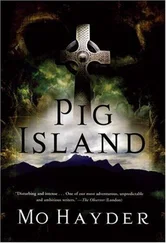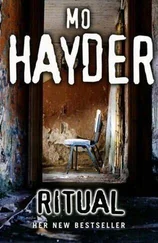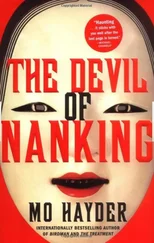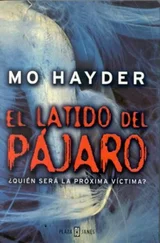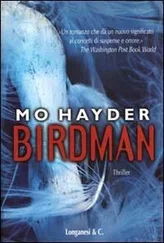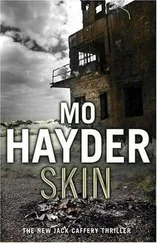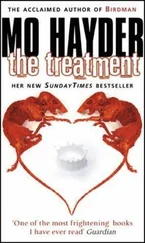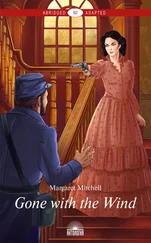‘Something I wanted to ask you. About the hospital today.’
‘What about it?’
‘The tests they ran – they can’t find what Moon used to knock you out. None of you are testing positive for any of the major inhalant groups. And you had different reactions from the Costello women. You were the only one who heaved. Can you maybe speak to the hospital? Give them a bit more information.’
‘A bit more ?’
‘Yeah. Maybe just give them the shirt you were wearing if you haven’t washed it. They’ll test your stomach contents. Just give them a call, mate. Make the men in the white coats happy?’
Prody let all the air out of his lungs. Still his eyes hadn’t moved. ‘Jesus. Yes. Of course. If I have to.’ He wound up his window. Started the car again and drove out into the street. Caffery followed a few steps behind, then stopped with one arm looped wearily over the gate, watching until the little Peugeot lion logo, lit red by the brakelights, disappeared from view.
He turned to Myrtle. Her head was down. She wasn’t looking at him. Caffery wondered if she felt as empty as he did. As empty and as scared. There wasn’t much time. He didn’t need a profiler to tell him what was next. Somewhere there was a family with cameras in their kitchen. In the parents’ bedroom too. He could sense it. Could smell it coming. In fact, if he had to put a stopwatch on it, he’d say there was less than twelve hours left before it happened again.
Jill and David Marley were sitting in the tops of the plane trees that bordered the garden. ‘London planes. The lungs of London.’ David Marley was smiling as he spoke. He was drawing tea from an elaborate samovar into a delicate bone-china cup. ‘Breathe in, Flea. Have to keep breathing in. No wonder you feel so sick.’
Flea began to climb the tree to her parents. But it was hard going – the leaves were in the way. Too thick, too choking. Each had a different colour and a different texture that she sensed as a taste in her mouth, either thin and acid or smooth and suffocating. Fighting her way through just a foot of them took for ever.
‘Keep breathing,’ came her father’s voice. ‘And don’t look down at yourself.’
Flea knew what he meant. She knew her stomach was swelling. She didn’t need to look down to know. She could feel it. Multicoloured worms as thick as fingers weaving their way through her intestines. Breeding and rolling and growing.
‘Shouldn’t have eaten it, Flea.’ Somewhere overhead in the trees her mother was calling. ‘Oh, Flea, you shouldn’t have touched that sandwich. You should have said no. Should never trust a man with clean trousers.’
‘Clean trousers?’
‘That’s what I said. I saw what you were doing with that man in the clean trousers.’
Tears ran down Flea’s face, a sobbing noise was coming out of her mouth. She’d climbed all the way up the tree. Except now it wasn’t a tree. It was a staircase – like an Escher painting, a staircase that started in a rickety Barcelona building, then twisted and stretched into the air above the roofs, sticking out naked and unsupported in the blue where clouds raced by. Mum and Dad were at the top. Dad had walked down a few steps and was holding his hand out to her. At first she’d reached for it gladly, knowing that taking Dad’s hand was salvation, but now she was crying because, no matter how hard she tried to grasp it, he was subtly avoiding letting her do it. He wanted her to listen.
‘I told you it’s not a sweetie. It’s not a sweetie.’
‘What?’
‘ It’s not a sweetie, Flea. How many times do I have to tell you . . .’
Her eyes flew open. She was back in the barge. The last of the dream battered itself futilely against her eyes, Dad’s voice ringing around the echoey barge – it’s not a sweetie . She lay there in the darkness, her heart thudding crazily. Moonlight was coming through the two portholes in the hull. She checked the Citizen. Three hours since she’d crawled up here, aching and light-headed from exhaustion and blood loss. The T-shirt was wrapped tightly around the wound: it seemed to be holding back the blood for the time being, but what she’d already lost had done the damage. Her skin was clammy, her heart was having moments of jittery palpitations, as if she’d mainlined pure adrenalin. She’d dismantled the acrow prop from under the hatch and laid it across the shelf. Then she’d crawled between the acrow and the hull and, just as she could feel the blood loss pulling her under, had lain on her side, one arm stretched out, pinioned against the hull.
The acrow prop may have stopped her falling into the water in her unconscious state, but it was useless as a tool for getting her out of here. She’d struggled with it for hours though she knew, in her heart, it was never going to hoist the hatch open with the weight of the windlass on it. There had to be another way.
It’s not a sweetie, Flea . . .
She twisted her head to look at the hatch she’d come through. Behind her the barge slanted downwards, the water in the stern compartment nearly touching the roof. Not a sweetie . Acetylene – the gas the chunk of calcium carbide would produce if it was thrown into water – was slightly lighter than air. She pushed herself up on her elbows and considered how the water lay, then the underside of the deck with its cobwebs and rust. She turned her chin upwards and eyed the rope locker. There was a small hole rusted through it. She’d be wasting her time punching that open because the egress to the surface that the rope would have been fed through was tiny – she’d already had her light up there and studied it and it was the size of a fist. Even so the rope locker was making things stir in her head. Acetylene would rise to the top of a box like that. There’d be leakage into the hull but it might – might – not get under the lip above the hatch into the stern. If she was back there, behind the bulkhead. And if the gas was in here…
It was dangerous, it was insane, and it was the sort of thing Dad would have done without a second’s hesitation. With a grunt she levered the acrow off the ledge, let it fall into the water. She swung her legs down. Felt the exhausting, killing drain of blood away from her head into her torso, the stammer of her heart and blinding waves of static circling her skull. She had to sit, her eyes closed, breathing in a slow, concentrated rhythm until the barge stopped swaying around her.
When her heart had settled back to where it belonged she reached up and found the lump of calcium carbide in the rucksack. She’d almost peeled it from the carrier bag when a noise came from out in the tunnel. The familiar clink-clink-clink of a pebble falling down the air shaft. A splash in the water. She sat, head turned, mouth slightly open, her heart hammering again. Cautiously she returned the chemical ball to the rucksack. And then, almost as if whoever it was had crept up stealthily, she heard the grunt of the grille giving way to human weight and the splash of water. Two splashes. Three.
In absolute silence she tipped herself off the ledge into the water. Put her hand against the hull for support and inched her way slowly to the other side of the barge. Every now and then the faintness came buzzing back and she’d stand still, breathing hard and silently through her mouth, fighting to lock down the nauseating swaying sensation. Six inches from the hole she stopped, her back to the hull so she could see out. The tunnel looked empty. Moonlight streamed in. But on the far wall the rope was swaying. She held her breath. Listened.
A hand came through the hole, holding a torch. She shot back.
‘Flea?’
She got her balance. Breathing hard.
Читать дальше
